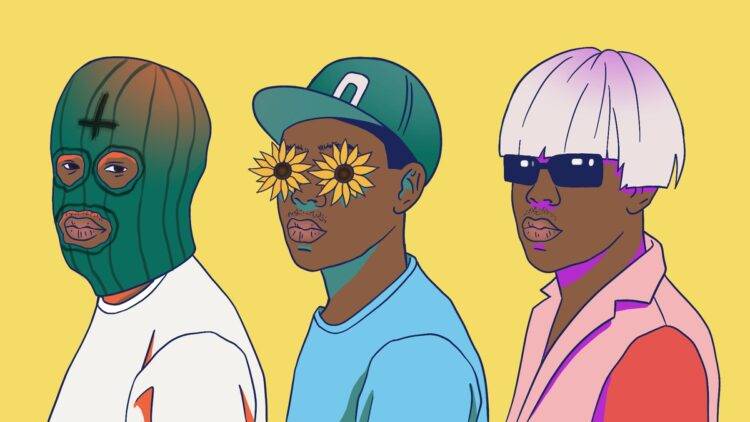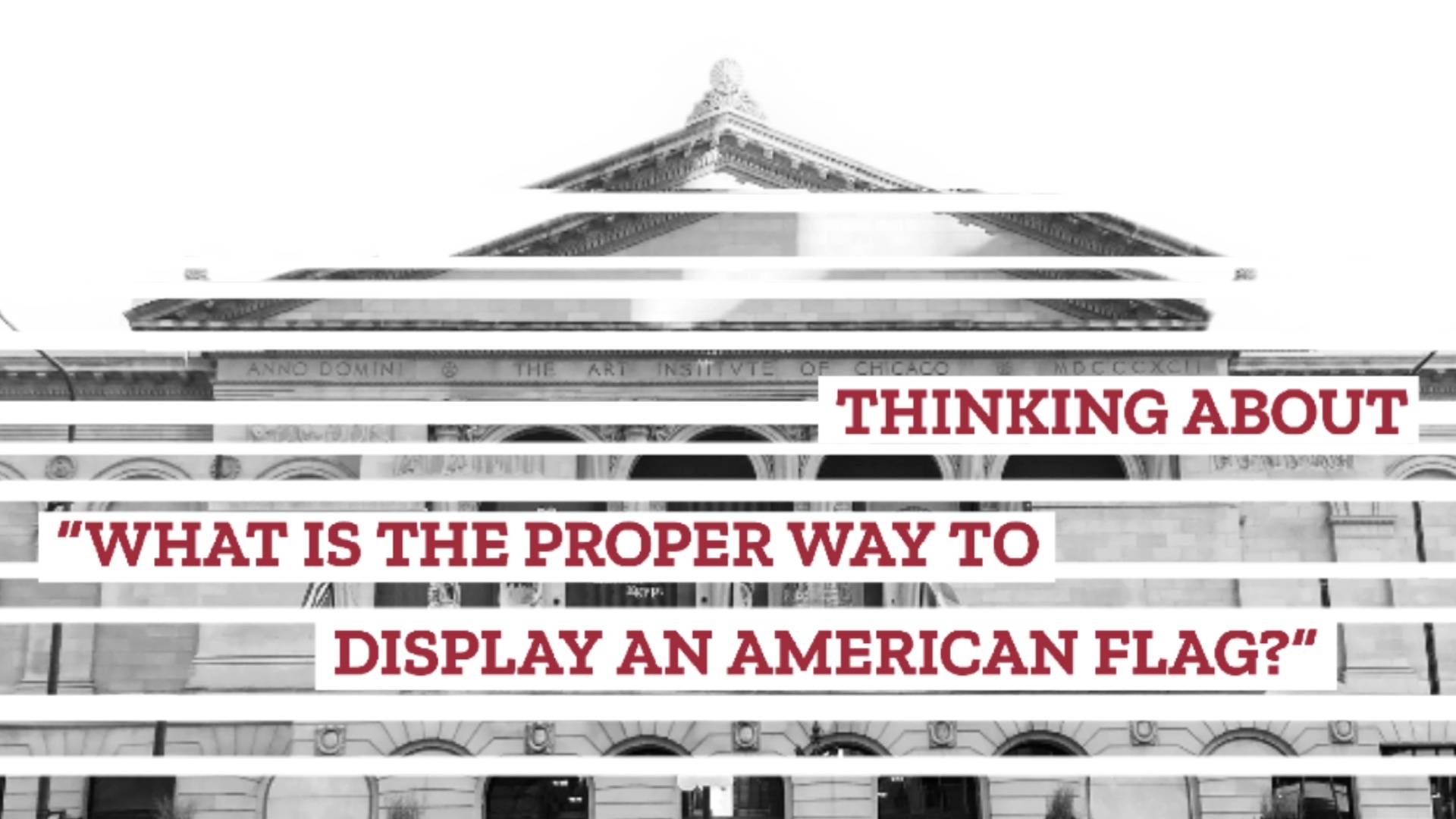
CONTENT WARNING: REFERENCES TO HOMOPHOBIC SLURS
The first time I encountered Tyler the Creator, he was eating a cockroach.
That’s from the music video for “Yonkers”, the black-and-white single-take video. I watched it because Tyler had just won Best New Artist at the MTV Video Music Awards, back when that mattered. The lyrics were crude, the video disquieting, and the roach was horrifying.
Eleven years later, I’m shouting at the top of my lungs from the nosebleeds of the United Center, “A MOTHERF*CKING GOBLIN!”, as Tyler the Creator closes up “Yonkers,” reaching the halfway mark of the Chicago leg of his “CALL ME IF YOU GET LOST” tour.
What changed?
When I first loaded “Yonkers” up on Youtube, I was 16. Since then, I finished high school. Went to college. Picked up and dropped boxing. Worked an office job. Picked up, and dropped bouldering, then picked it up again. Finished college. Dated, dumped, discovered new things. So, as one would expect, I’ve changed.
But Tyler changed too. Tyler released the music video for “Yonkers” when he was 20. It was the second track on his first mixtape, “Bastard.” Since then, he’s released six full-length albums, worked with Jay Z, Frank Ocean, Lil Wayne, and Kali Uchis; collaborated multiple times with his collective, Odd Future; made a TV show on Adult Swim, directed 29 music videos, voiced a character on Regular Show, made his own fashion and perfume line, GOLF le FLEUR; and very importantly, provided the soundtrack for the 2018 reboot of “The Grinch.”
He’s come a long, long way since eating a roach in one take.
After “Yonkers,” I was drawn to Tyler; to Odd Future, Casey Veggies, Earl Sweatshirt. Despite my distance from their cultural context, I connected with their teenage angst, like on “Radicals,” from his 2011 album “Goblin.” “Kill People, Burn Shit, Fuck School” — I couldn’t align with the first two, but the third one, I felt that in my bones. When Tyler says he trusts nobody but heroin addicts and the Teenage Mutant Ninja Turtles on “DTA?” Poetry. Did I know any heroin addicts? Nope.
Yes, it was juvenile. As was I.
But was Tyler as vile as his persona suggested? Governments certainly thought so. In 2013, an Australian grassroots petition movement upset with the misogyny and homophobia of Tyler’s lyrics forced him to cancel a planned tour Down Under. In 2014, he couldn’t get into New Zealand either. And in 2015, UK immigration authorities cited an order from Prime Minister Theresa May herself when barring him from entering the UK for three to five years due to the values he represented.
Speaking of values, “Radicals” starts with a disclaimer from Tyler.
“Hey, don’t do anything that I say in this song, okay?
It’s fuckin’ fiction
If anything happens, don’t fuckin’ blame me.”
Does “fiction” excuse the many times prior to that he’s used homophobic slurs? Does it make up for this interview quote from the 2011 VMAs, where he won Best New Artist?
“I’m not homophobic. I just think ‘f*ggot’ hits and hurts people. It hits. And ‘gay’ just means you’re stupid.”
That’s not the full quote. I’m cherry-picking. The rest of the quote is:
“I don’t know, we don’t think about it, we’re just kids. We don’t think about that shit. But I don’t hate gay people. I don’t want anyone to think I’m homophobic.”
We’re just kids. It’s fiction. Not exactly apologetic.
The next music video I watched was “IFHY,” in 2013. As soon as the video popped up in my YouTube recommendations, I instantly knew IFHY stood for “I F*cking Hate You”. One minute and 15 seconds in, Tyler does indeed say, “I fucking hate you.”
By that point in the video, I’m entranced by the bizarre prosthetics on Tyler’s face, the pastel colors of the video, the toy-house aesthetic. It’s a song about a man oscillating between hate and love for a woman who he can’t get out of his mind.
“IFHY” is from “Wolf,” Tyler’s first concept album. He plays multiple characters, all at summer camp. It was maniacal, misanthropic; full of Tyler’s usual grotesque and violent imagery. Except, this time, it’s clear he knows that. The most disturbing track on the album for me is “Colossus,” where Tyler takes on the voice of a manic fan, a fan obsessed with the persona Tyler created in “Bastard,” a fan who explicitly loves “Radicals” but didn’t hear its disclaimer that “it’s all fiction.”
Now I’m starting to take Tyler more seriously. He’s establishing himself as a self-referential, complicated musician; a bundle of contradictions in a baseball cap and a striped t-shirt. He’s probably still homophobic, though he proudly states he knew his good friend Frank Ocean was queer because he saw the way Frank ate his Pop Tarts. He’s not sensitive, but something is changing.
In 2015, “Cherry Bomb” drops, and it’s weird. I only really get into it when Tyler releases the instrumental version, which highlights his skill in music production. But it doesn’t grab my attention the way “Wolf” did.
And then in 2017, “Flower Boy” — the album I had been waiting for Tyler the Creator to make. Well, not really. I’d been hoping someone, anyone, would have snatched its concept and its tracks out of the ether. But really, only Tyler could have made it.
“Flower Boy” is about loneliness. It’s about the solitude of fame. And, to the surprise of many, it’s about queerness. In “Foreword,” the album’s first track, Tyler is sombre, serious, dour. He contemplates his life — which, to this point, has been a success. Right? He drives his car, waiting for either the gas or the road to run out. Something is plaguing him.
In “Boredom,” we hear one reason — Odd Future has disbanded, and he lives in this mansion of luxury alone and friendless. On “911”, he delivers one of my favorite lyrics — “I’m the loneliest man alive, but I keep on dancing to throw ‘em off”. And then we have “Garden Shed:”
“Truth is, since a youth kid,
Thought it was a phase.
Though it’d be gone like the
Phrase; “poof” gone
But it’s still going on.”
When “Garden Shed” ended, I restarted it immediately. Did I hear that right? Did Tyler “banned from Australia for homophobia,” Tyler “gay means stupid” the Creator just come out of the closet?
Earlier in the album, on “I Ain’t Got Time!”, Tyler quips, “I’ve been kissing white boys since 2004.” But the braggadocio of that song, its swelling beats, Tyler’s delivery all made me think it was a joke. However, coupled with the sincerity of “Garden Shed”, the truth becomes clearer.
But is it true? Or is it still all fiction? Which parts of his songs are real? Is he the titular Flower Boy? Is the beige tan man the Flower Boy loves a real person?
Funnily enough, it doesn’t matter to me.
One of the last tracks on the album is “November”. In it, Tyler, or the Flower Boy, describes the concept of a November. A “November” isn’t just a month; it’s a moment. It is joy, transient by nature. Novembers, like any month, or song, or album, don’t last forever.
I have a little notebook of my own Novembers. One November is from a trip to London. I was walking to lunch while listening to “Flower Boy.” I turned a corner, the same time as the beat for “See You Again” dropped, and witnessed the sun’s rays blending with the River Thames. It was just for a second, but that’s the thing about Novembers. They don’t last.
In Tyler’s next album, “IGOR,” his new persona IGOR is going to fall in love, attain happiness, and then drift apart from his male lover. We return to the realm of “IFHY,” but this time, things have queered.
I don’t listen to “IGOR” easily now. It was my go-to album after a devastating breakup. In the album’s last track, “ARE WE STILL FRIENDS,” IGOR raps, “I don’t want to end this season on a bad episode.” When IGOR’s voice breaks at the end of the track, his voice warbling through distortions, his scream somehow still in key? I felt that.
And that takes us to Tuesday, 22nd February, 2022, with me, at the United Center, screaming “A MOTHERF*CKIN GOBLIN!”
The concert starts with Tyler rising from the stage, in a Rolls Royce, before an opulent mansion. This house is the ideal form of luxury to a specific demographic, one that usually does not include people like Tyler the Creator. But this isn’t Tyler the Creator. This is Tyler Baudelaire, the globe-trotting, suave, jet-setting persona from his latest album, “CALL ME IF YOU GET LOST.” Tyler Baudelaire has earned his right to be here.
He is a one-man powerhouse. He leaps, he screams, he dances to songs from “CALL ME IF YOU GET LOST.” Then a butler steps onstage, ushering Tyler Baudelaire to a “speedboat.” When he steps off, there is a patch of grass at the other end of the stage. It’s dry, grassy, and scattered with pockets of shrubbery. It’s the patch of grass behind Tyler on the album art for “Flower Boy.”
Tyler Baudelaire steps onto the patch and transforms instantly. As the Flower Boy, his first song is “Boredom.” — a song that reminds us of the loneliness of his success, living a life without his old friends, in a mansion by himself.
When I first listened to “CALL ME IF YOU GET LOST,” I didn’t instantly connect with it. I thought Tyler Baudelaire was too happy. Now I know for sure that he wasn’t. He never could be.
Onstage, Tyler does two more songs from “Flower Boy”, and then asks us if we could humor him. If he can do some of his old stuff.
Cue “Yonkers.”
But not just “Yonkers”. Several of his old hits connected seamlessly together, including “IFHY” and other tracks from “Wolf”. Mosh pits form in the standing crowd. That’s the thrashing energy that “old Tyler” commands. The patchy, shrub-pocked grass becomes the arid ground of the summer camp in “WOLF,” angst-ridden and rebellious.
Throughout the concert, Tyler chides the audience for not responding to his calls loud enough, each time leading to a louder roar. Back on the boat, he repeats the refrain of “I THOUGHT YOU WANTED TO DANCE,” and thousands of people join him. But he keeps saying, “Y’all don’t get it.” Each time, the audience gets louder, but Tyler doesn’t stop protesting. “Y’all don’t get me. Y’all don’t get what I’m singing about.”
He’s no longer teasing. He’s serious.He waits for everyone to be quiet. And then he delivers the third verse to the song, a verse about heartbreak, unrequited love, and loneliness.
Now the boat is back at the mansion. The butler helps him ashore.
This is when Tyler finally performs songs from “IGOR.” There’s “EARFQUAKE,” “I THINK,” and what Tyler says is his favorite song he’s ever written, “NEW MAGIC WAND.” In it, IGOR laments that his lover is dating a woman who is pulling him away. Throughout the song, Tyler leaps across the stage, dancing with his mic-stand, getting the crowd riled up. He’s the loneliest man alive, but he’ll keep on dancing to throw them off.
His last song of the night is from “CALL ME IF YOU GET LOST.” People are bouncing, moving, the same as they have been all night. Pyrotechnics flare, sparks fly from the ceiling. And then the song is over. The concert is over.
The door to the mansion opens up. Tyler walks to it, and this time, no butler is in sight. He says goodnight, and steps through the door.
And then he’s gone.
Wolf grows into Flower Boy, who falls into IGOR, who rises into Tyler Baudelaire, who goes back into the mansion, alone. All of Tyler the Creator’s personas collide and become one. Now, there is no more dancing to be done.
I have to admit I am cherry-picking, selecting parts of this concert that fit who I imagine Tyler to be. A teenager who had a meteoric rise to fame and infamy, notably for homophobia and misogyny, rapping in a collective with his best friends, concealing his gayness. A man who is now grown, wealthy, successful, celebrated by the music community, living his best material life, yet still alone. A romantic who is constantly yearning for people he cannot have.
Is that who Tyler Gregory Okonwe “is?” I don’t think so. I think this concert, like all of his albums, is a persona. Because Tyler learnt early in life that all of fame is a performance. All of our public lives are fiction.
His performance spans across albums, characters, personas. And with each one, I’ve always heard Tyler asking me behind the lyrics.
“Who are you, really? Who are you pretending to be? Why aren’t you being yourself?”
The answers remain elusive to me. But Wolf, the Flower Boy, IGOR, Tyler Baudelaire, and Tyler the Creator help me feel less alone.








his last name is actually okonma